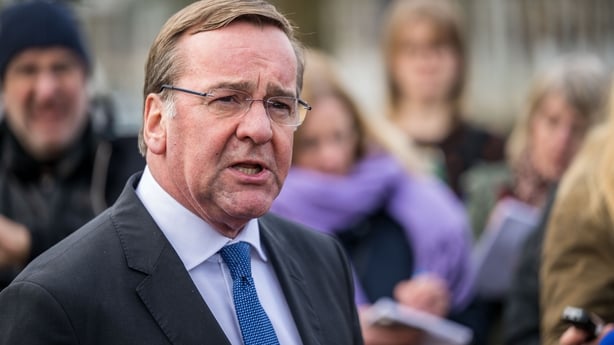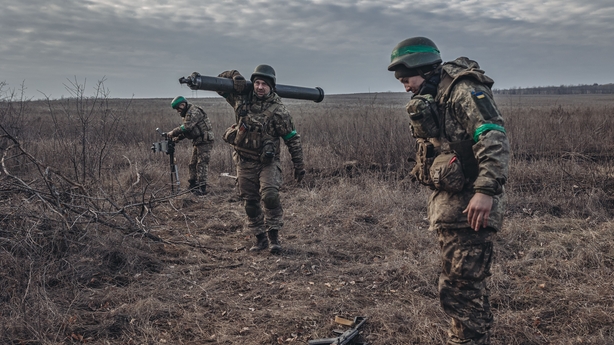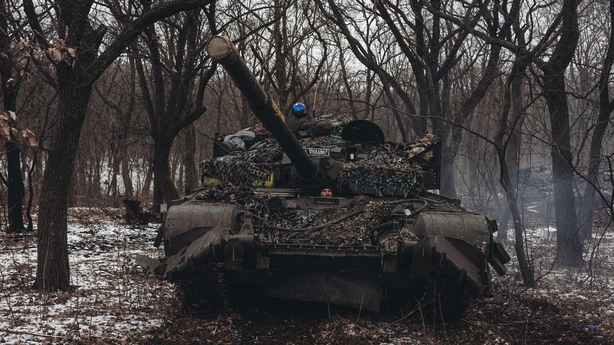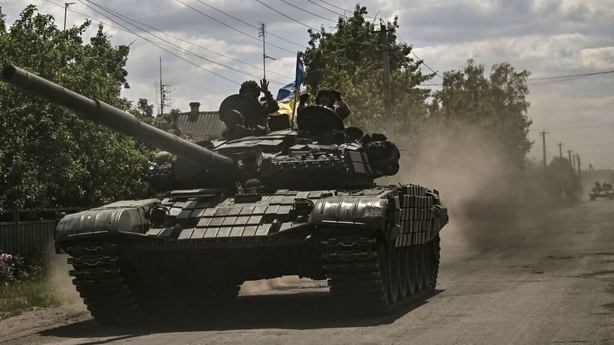German officials have said no decision has been made yet on tanks sought by Kyiv at a crucial US-led meeting on boosting military aid to Ukraine, despite an emotional plea from Ukrainian President Volodymyr Zelensky.
Expectations grew ahead of the meeting at the Ramstein Air Base in Germany that Ukraine's Western allies would agree to send German-made Leopard tanks, amid mounting pressure from several European countries to do so.
But German Defence Minister Boris Pistorius told reporters on the sidelines of the event that "we still cannot say when a decision will be taken, and what the decision will be, when it comes to the Leopard tank".
He also denied accusations that Germany alone was blocking tank deliveries. The impression that "there is a united coalition and that Germany is standing in the way is wrong," he said.

Mr Pistorius added that he has ordered a stock-take of Leopards so that action can follow quickly if the decision were to be positive for delivery.
Kyiv wants the powerful Leopard tanks to press offensives against Russian troops, but the Kremlin has warned their delivery by the West would amount to an "extremely dangerous" escalation.
Germany's hesitation so far on supplying the tanks has led to fierce criticism of Berlin from other countries such as Finland and Poland, which have their own stocks of Leopards, but would need German approval to send them.
Mr Zelensky has renewed his plea for Western allies to "speed up" arms deliveries to Ukraine as he addressed the conference, which gathered representatives from 50 countries, via video-link.
Partners needed "not to bargain about different numbers of tanks but to open that principal supply that will stop evil", the Ukrainian leader said.

Make the meeting a "Ramstein of tanks", Mr Zelensky said, calling for future gatherings to "go down in history as a Ramstein of F-16s and long-range missiles".
The meeting's host, US Secretary of Defense Lloyd Austin, urged allies to "dig even deeper" to support Ukraine with weaponry at a crucial time, noting that Russia is "running out of ammunition and suffering significant battle losses".
We need your consent to load this rte-player contentWe use rte-player to manage extra content that can set cookies on your device and collect data about your activity. Please review their details and accept them to load the content.Manage Preferences
"This is a decisive moment for Ukraine. The Ukrainian people are watching us, the Kremlin is watching us, and history is watching us," Mr Austin said.
The Kremlin responded by accusing the West of harbouring a "dramatic delusion" that Ukraine can win on the battlefield, adding that the conflict was "developing in an upward spiral".
In the run-up to the meeting at Ramstein, Western allies have offered a flurry of new arms shipments.
Finland became the latest to announce a €400m military aid package, its largest to date, and including heavy artillery as well as munitions.
It comes after allies including the US and Britain announced substantial new arms shipments on the eve of the Ramstein talks.
The Pentagon offered $2.5bn worth of supplies for Ukrainian forces, including Bradley fighting vehicles, armoured personnel carriers, air defence systems, and tens of thousands of rockets and artillery rounds.

But it did not include the ATA long-range missiles sought by Ukraine.
The missiles, which can travel up to 300km, could enable Ukraine to strike Russian supply routes and depots far behind the front lines that are not reachable with current HIMARS rocket systems.
But Western partners also fear that Ukraine could use long-range weapons to hit deep inside Russian territory or Crimea - a peninsula Moscow annexed in 2014 - despite Kyiv promising it would not do so.
Almost a year into Russia's invasion of Ukraine, the most intense fighting in recent months has centred around the eastern Donetsk region.
In Soledar, about 60km from Kramatorsk, the first humanitarian convoy from the UN finally arrived in the town that has been largely reduced to rubble by intense fighting.
"Recent fighting in and around Soledar has caused widespread destruction, leaving people there in dire need of humanitarian assistance," said Jens Laerke, a spokesman for the UN humanitarian agency OCHA.
Russia claims to have seized Soledar, but Ukraine insists the fighting, in which both sides have suffered heavy losses, is ongoing.
Fighting on southern front 'sharply' increases
Fighting has "sharply increased" in the southern Ukraine region of Zaporizhzhia, where the front has been largely stagnant for months, a senior Moscow-installed official in the area has said.
"In the direction of Zaporizhzhia, the intensity of military activity has sharply increased," the official, Vladimir Rogov, said on the Telegram social media platform.

Both Mr Rogov and the Russian army said Moscow's forces had seized the village of Lobkove, around 50km south of the Ukrainian-held regional capital, also called Zaporizhzhia.
He added that Russian forces had fired at Ukrainian positions with "tanks, mortar and artillery" in a dozen villages in the region.
The Ukrainian army said that "more than 20 settlements" had been attacked.
Mr Rogov had announced Thursday a "local offensive" in the region near the town of Orikhiv.
He told the Russian state-run TASS news agency that this was "not yet the storming" of the town, which lies southeast of Zaporizhzhia, but that fighting had reached its suburbs.
"Hills have been taken that determine fire control over Orikhiv and other settlements," he said.
The front in southern Ukraine has been considerably quieter recently than in the east, with Moscow withdrawing from the major city of Kherson in November.
Ukrainian military spokeswoman Natalia Gumenyuk told local media that fighting along the southern frontline was "difficult", including in Zaporizhzhia.

